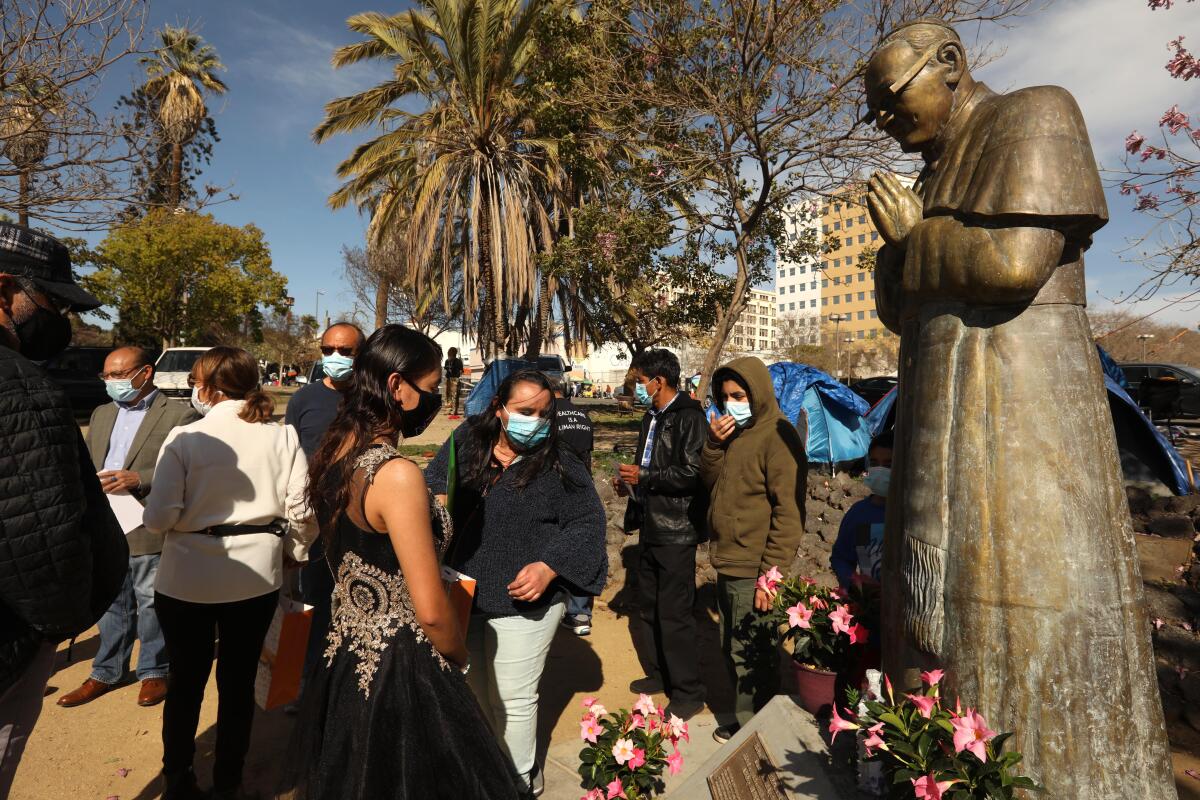Even if you’re vaccinated, Easter and Passover bring COVID-19 dangers. What to know

Even with vaccinations increasing and COVID-19 cases still low in California, officials are urging caution during the spring holidays.
“While conditions have definitely changed, particularly as we’ve vaccinated millions of individuals over the past three months, we do not yet have enough vaccine protection across the county to prevent more transmission if we’re not extraordinarily careful in these next few weeks,” Los Angeles County Public Health Director Barbara Ferrer told the county Board of Supervisors recently.
Here are some tips for Passover and Easter:
The basics
- It’s best to celebrate Easter, Passover, spring break and other holidays virtually, or to limit gatherings to members of the same household.
- A travel advisory remains in effect for Los Angeles County, and residents are supposed to stay within 120 miles of their home unless they’re traveling for essential purposes. Those arriving in L.A. County from outside the state should self-quarantine for 10 days.
- Indoor gatherings of up to three separate households are permitted by public health rules, provided there’s mask-wearing and distancing if participants aren’t fully vaccinated, but such activities still carry risk, officials said.
Safety precautions
Officials say following safety guidelines is still important even if you have been vaccinated.
Basic steps like wearing masks in public and keeping a physical distance from those outside your household will still provide an additional layer of safety, experts say, and help further drive down COVID-19 transmission — eventually allowing more parts of the economy to reopen.
“It’s important for everyone to continue using all the tools available to help stop this pandemic as we learn more about how COVID-19 vaccines work in real-world conditions,” CDC guidance states, particularly because it’s not yet definitively known “whether getting a COVID-19 vaccine will prevent you from spreading the virus that causes COVID-19 to other people, even if you don’t get sick yourself.”
Universal mask wearing, in particular, is seen as critical in keeping the spread of the coronavirus on a downward trend. A recent CDC report found that states that have imposed mask orders have seen declines in the growth of COVID-19-associated hospitalizations.
Holiday event tips
Officials say to avoid in-person holiday events if possible. But if you do have one, the agency offered these tips:
If attending a gathering:
- Have conversations ahead of time to understand expectations for celebrating together.
- Bring your own food, drinks, plates, cups and utensils.
- Wear a mask indoors and outdoors.
- Avoid shouting or singing.
If hosting:
- If you are sick or have been near someone who thinks they may have or have been exposed to COVID-19, cancel the gathering.
- Provide single-use options, like salad dressing and condiment packets, and disposable items like plates and utensils.
- Limit the number of guests.
- Have extra unused masks available for your guests and encourage everyone to wear them inside and outside.
- Clean and disinfect frequently touched surfaces and items between use.
- If celebrating indoors, bring in fresh air by opening windows and doors, if possible. You can use a window fan in one of the open windows to blow air out of the window. This will pull fresh air in through the other open windows.
- Have a separate space for guests to wash their hands or provide hand sanitizer.
Ferrer said she hopes increased vaccination will eventually lead to more freedoms. But caution still needs to be the watchword. Coronavirus case rates are on the rise in the United States in the aggregate, driven by increases in several states including New Jersey, New York, Pennsylvania and Florida, although California’s numbers continue to decline.
“We are so close, perhaps only several months away from having enough people vaccinated to accelerate our reopening without adverse effects,” Ferrer said Saturday in a statement. “However, we remain quite concerned with reports of rising cases of COVID and hospitalizations in a growing number of states. We know the virus does not respect borders.”
More to Read
Sign up for Essential California
The most important California stories and recommendations in your inbox every morning.
You may occasionally receive promotional content from the Los Angeles Times.













